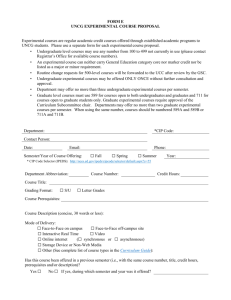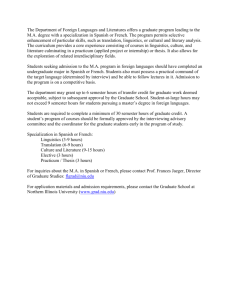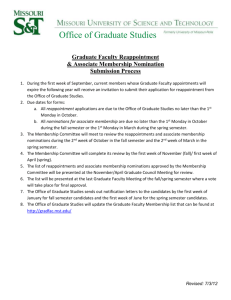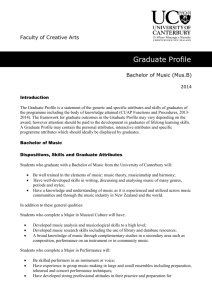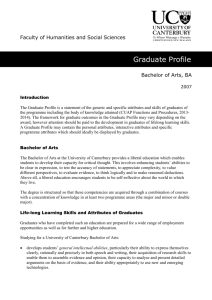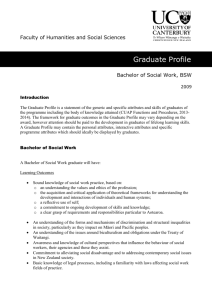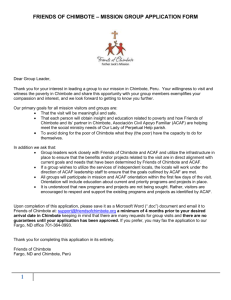Standard 2.7.1
advertisement
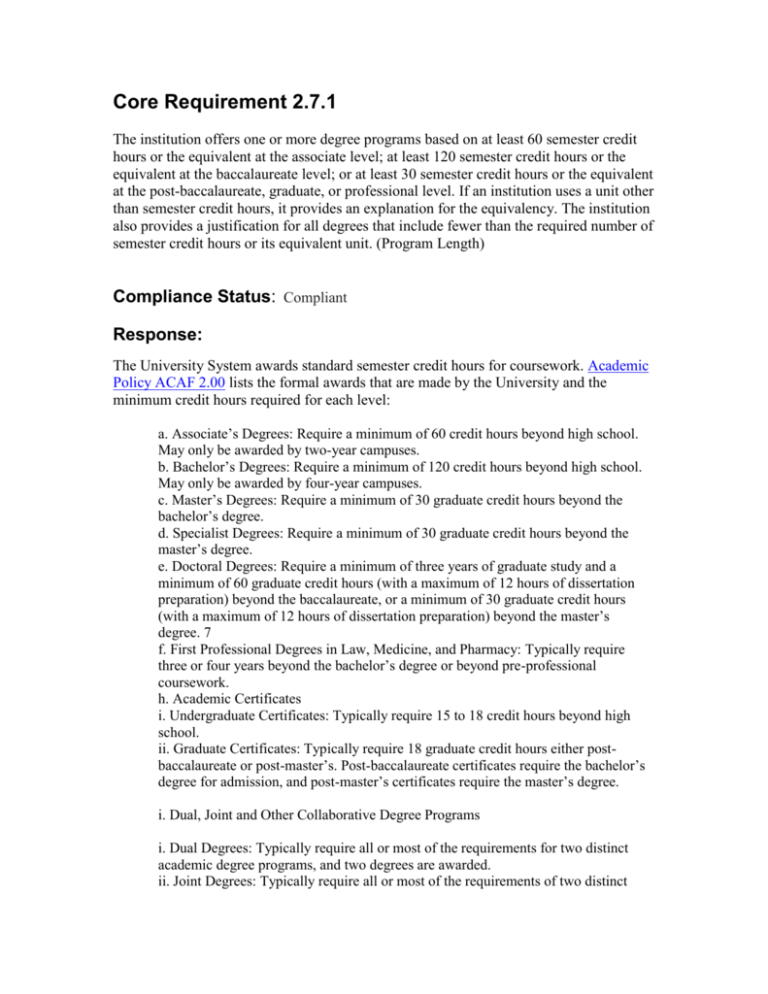
Core Requirement 2.7.1 The institution offers one or more degree programs based on at least 60 semester credit hours or the equivalent at the associate level; at least 120 semester credit hours or the equivalent at the baccalaureate level; or at least 30 semester credit hours or the equivalent at the post-baccalaureate, graduate, or professional level. If an institution uses a unit other than semester credit hours, it provides an explanation for the equivalency. The institution also provides a justification for all degrees that include fewer than the required number of semester credit hours or its equivalent unit. (Program Length) Compliance Status: Compliant Response: The University System awards standard semester credit hours for coursework. Academic Policy ACAF 2.00 lists the formal awards that are made by the University and the minimum credit hours required for each level: a. Associate’s Degrees: Require a minimum of 60 credit hours beyond high school. May only be awarded by two-year campuses. b. Bachelor’s Degrees: Require a minimum of 120 credit hours beyond high school. May only be awarded by four-year campuses. c. Master’s Degrees: Require a minimum of 30 graduate credit hours beyond the bachelor’s degree. d. Specialist Degrees: Require a minimum of 30 graduate credit hours beyond the master’s degree. e. Doctoral Degrees: Require a minimum of three years of graduate study and a minimum of 60 graduate credit hours (with a maximum of 12 hours of dissertation preparation) beyond the baccalaureate, or a minimum of 30 graduate credit hours (with a maximum of 12 hours of dissertation preparation) beyond the master’s degree. 7 f. First Professional Degrees in Law, Medicine, and Pharmacy: Typically require three or four years beyond the bachelor’s degree or beyond pre-professional coursework. h. Academic Certificates i. Undergraduate Certificates: Typically require 15 to 18 credit hours beyond high school. ii. Graduate Certificates: Typically require 18 graduate credit hours either postbaccalaureate or post-master’s. Post-baccalaureate certificates require the bachelor’s degree for admission, and post-master’s certificates require the master’s degree. i. Dual, Joint and Other Collaborative Degree Programs i. Dual Degrees: Typically require all or most of the requirements for two distinct academic degree programs, and two degrees are awarded. ii. Joint Degrees: Typically require all or most of the requirements of two distinct academic degree programs administered by two or more of the University's colleges or schools, or by two or more universities, and a single degree is awarded. iii. Other Collaborative Degrees: Programs governed by specific agreements typically involving an articulated transfer of credit from one institution to another for the award of a single or multiple degrees. May also include bridge programs that require non-credit study prior to course work for academic credit. In addition, ACAF 2.00 describes the procedures required to create and revise academic programs. Briefly, the Faculty Senate or the Graduate Council, the Provost, the President, the Board of Trustees, the South Carolina Commission on Higher Education (CHE), and SACS must approve new programs or changes to programs involving a change in the length of the program. Core Requirement 2.7.2 contains a more detailed explanation of the process. To ensure that the hours required for graduation follow best practices, the University relies on program accreditation and external program review. The Columbia External Program Review Spreadsheet provides information on external review. While the CHE no longer mandates external program review (as described in Core requirement 2.7.2), the letter from the Provost to the academic deans demonstrates the University’s commitment to following best practices. The Program Credit Hours Spreadsheet lists the number of hours required to complete each degree, and includes a link to the program description in the Bulletins. Program length is required to be stated in each program description in the Bulletins. The regional campuses all offer associate degrees requiring 60 semester credit hours. Documents ACAF 2.00 – Create and Revise Academic Programs http://www.sc.edu/policies/acaf200.pdf Columbia External Program Review Spreadsheet http://ipr.sc.edu/pdf/evaluations/ProgAccredRev.pdf Provost Memo to Academic Deans http://ipr.sc.edu/pdf/evaluations/ExtProgRevMemo.pdf Program Credit Hours Spreadsheet http://ipr.sc.edu/xls/ProgHrsChart.xlsx

